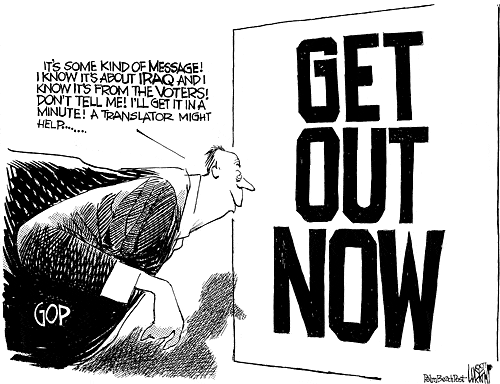Monday, July 30, 2007
AFP: NGOs report humanitarian crisis in Iraq


NGOs report humanitarian crisis in Iraq
By THOMAS WAGNER, Associated Press Writer2 hours, 49 minutes ago
About 8 million Iraqis — nearly a third of the population — need immediate emergency aid because of the humanitarian crisis caused by the war, relief agencies said Monday.
Those Iraqis are in urgent need of water, sanitation, food and shelter, said the report by Oxfam and the NGO Coordination Committee network in Iraq.
The report said 15 percent of Iraqis cannot regularly afford to eat, and 70 percent are without adequate water supplies, up from 50 percent in 2003. It also said 28 percent of children are malnourished, compared with 19 percent before the 2003 invasion.
"Basic services, ruined by years of war and sanctions, cannot meet the needs of the Iraqi people," said Jeremy Hobbs, the director of Oxfam International. "Millions of Iraqis have been forced to flee the violence, either to another part of Iraq or abroad. Many of those are living in dire poverty."
The report said more than 2 million people — mostly women and children — have been displaced within Iraq, and 2 million Iraqis have fled the country as refugees, mostly to neighboring Syria and Jordan.
Hobbs urged Iraq's government, the United Nations and the international community to do more to help Iraqis, despite the risk of the war's widespread violence involving coalition forces and insurgents.
"The Iraqi government must commit to helping Iraq's poorest citizens, including the internally displaced, by extending food parcel distribution and cash payments to the vulnerable. Western donors must work through Iraqi and international aid organizations and develop more flexible systems to ensure these organizations operate effectively and efficiently," Hobbs said.
Oxfam has not operated in Iraq since 2003 for security reasons, but a survey it published in April found that more than 80 percent of aid agencies working in the country could do more if they had more money.
Some humanitarian organizations refuse money from governments with troops in Iraq, on the grounds of security and independence.
"The fighting and weak Iraqi institutions mean there are severe limits on what humanitarian work can be carried out. Nevertheless, more can and should be done to help the Iraqi people," Hobbs said.
Hunger, disease spread in Iraq - Oxfam report
BAGHDAD (Reuters) - Hunger and disease are spreading in Iraq as violence masks a deepening humanitarian crisis, British charity Oxfam said in a report on Monday.
The charity said 28 percent of Iraqi children are malnourished, 15 percent of Iraqis regularly cannot afford enough to eat and 70 percent lack clean drinking water, all sharp increases since 2003.
"The terrible violence in Iraq has masked the ongoing humanitarian crisis. Malnutrition amongst children has dramatically increased and basic services, ruined by years of war and sanctions, cannot meet the needs of the Iraqi people," Oxfam director Jeremy Hobbs said.
"The fighting and weak Iraqi institutions mean there are severe limits on what humanitarian work can be carried out. Nevertheless more can and should be done to help the Iraqi people," he said.
Two million Iraqis have been forced to flee the country since 2003, and at least as many have been displaced within Iraq.
Oxfam, which pulled out of Iraq along with most other aid agencies because of deteriorating security in 2003, said there are local charities within Iraq that are working to help the poorest Iraqis. But most are under-funded.
Some are afraid to accept aid from countries with troops in Iraq for security reasons, and Oxfam called on countries that have not sent troops to send more money for aid.